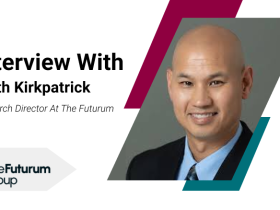Tell us how you came to be the CEO of NuroKor and what do you create with your team?
I founded NuroKor after researching alternative solutions for pain relief, initially for my own back and knee problems. I quickly realised the immense and underdeveloped potential of bioelectric technology as an electroceutical application.
I’ve always been naturally interested in science and knowing the side effects from long-term pain medication, as well as how addictive they can be, I wasn’t prepared to accept that as my future. I was fortunate enough to be given the opportunity to trial a basic nerve stimulator, which provided me with my first foray into the world of bioelectronics.
I then embarked on a seven-year journey, developing a ground-breaking therapy using the latest technology and best available medical evidence. NuroKor’s state-of-the-art, wearable technology uses peripheral nerve, microcurrent, and neuromuscular stimulation, to help manage pain and optimise recovery and physical performance.
The technology is also used by more than 50 Olympians and elite athletes, which meant recently we were ‘glued to the 2021 Olympics coverage as some of our ambassador athletes were taking part!
In terms of pain management, what we have achieved in less than three years is a viable alternative or adjunct for people who don’t want to rely on strong painkillers – something which drives each member of our team.
What are some of the distinctive features of NuroKor that differentiate you from your competitors?
As a company, our approach is always to question and demand scientific evidence to support the further refinement of our technology to meet patient and consumer needs.
It’s important that the technology is backed by solid credentials, in terms of both our investors (many of whom are clinicians) and patient data. There’s a lot of science behind the company and there is currently no other comparable, non-invasive technology available.
We’ve recently established a clinical division to lead our evaluation projects and to progress formal research – providing scientific evidence regarding the technology’s efficacy.
The work will provide important validation of bioelectrical therapy, strengthening the evidence for the technology to be incorporated into the wider healthcare realm.
Can you highlight some key features of NuroKor?
Our range of bioelectric devices is wearable, portable, and easy to use. which means people can go about their work and daily lives while using the therapy because it is small and discreet. We are driven by a desire to give people the power over their own care and pain management.
I don’t know of any other MedTech company that has almost 100 percent customer satisfaction, as we have, or that offers a 30-day money-back guarantee to people.
The positive feedback from users and patients is what motivates me on a daily basis. With the opioid problem escalating globally, as a life sciences company we are unwavering in our mission to disrupt the status quo to help to address this.
A recent clinical patient survey showed that 91% of our users were able to eliminate or reduce medication after using the technology, which is an achievement the whole team should be proud of.
Can you give us a sneak peek into some of the upcoming product upgrades that your customers can look forward to?
The team is currently hard at work progressing our 2nd Gen products, which feature both pain relief and therapy that will be personalised to each individual, based on their own data controlled via an app, it will be the only non-invasive, wearable treatment of its kind, enabling users to easily use it on a daily basis and to carry it with them as many of us currently carry painkillers in our bag or pocket. We’ve got a very engaged and supportive community of users, so we’re really excited to share the enhanced products with them in the near future.
What health tech trends have you seen emerge in the past couple of years?
Bioelectronics is one area of health tech that is growing rapidly – with the value of the global bioelectronics industry tipped to reach USD $25 billion by 2023.
I’ve seen first-hand how it can make a huge difference to people suffering from acute and chronic pain. Wearable devices, like those produced by NuroKor, use bioelectric nerve, muscle, and microcurrent stimulation to help manage pain and optimise physical performance for patients suffering from a wide range of conditions. This kind of tech is also small, portable, and non-invasive so it means it can be used anywhere, at any time, and removes the need for potentially harmful painkillers and other forms of medication.
During the lockdown, our sales surged by 156% as more people demanded an adjunct or alternative treatment they could use at home and this trend looks set to continue.
What role has bioelectronic tech played during the pandemic?
Over the past 18 months, we have seen a huge shift in the way consumers approach their health and wellness. Driven largely by necessity as a direct result of the pandemic, many people were unable to access health and wellbeing services as freely, or in the same ways as they used to; meaning there has been a huge surge in demand for at-home treatments, solutions, and products that can help protect our health both physically and mentally.
One of the biggest trends I expect to grow further is a rise in the use of health technology solutions that can be used directly by patients, in their own homes, without the need for intervention or application by a medical professional. Understandably, lots of people suffering from chronic and ongoing health issues still feel concerned about physically seeing their GPs or healthcare teams, so having access to tools that can treat or manage their conditions at home has the potential to be life-changing.
One of the benefits of bioelectronic tech is that it gives users control over how they manage their pain relief, discomfort, and performance enhancement. It can also reduce dependency on potent painkillers, whilst gaining long-lasting results.
How do you keep pace with the rapidly growing number of AI Solutions?
We continue to invest in research and in the latest technology available and this commitment sets us apart from many of our competitors.
Later this summer, we are launching the first trial involving our technology in conjunction with the NHS, which will help us to learn more about the therapeutic effect of the technology.
We plan to invest 43% of our forthcoming £20m Series-A raise into R&D and have recently opened a second UK base in Wales to progress this work. N uroKor’s 24-48 month roadmap includes the development of biosensor feedback, AI, and machine learning algorithms, which will feature in our next generation of products.
What is the difference between biotech and other wearable technology currently on the market?
Most wearable tech, like Fitbit and Apple Watches, take physiological measurements to improve training and/or performance.
In contrast, bioelectronic devices administer low-dose electrical currents to elicit a physiological response – either pain relief or tissue repair. This also improves exercise recovery and optimises the body’s tissues, maximizing performance.
Where do you see the biggest areas of improvement for Bioelectronic Devices?
Many of us live differently now and we are more informed about our health and the emerging technology there is available.
Consumers and patients will demand bioelectronics to be easily controlled, to be portable, and to deliver personalized treatment. A one-size-fits-all approach doesn’t work because our bodies are all different and we each need slightly different treatment modalities that can be tailored to meet our exact needs.
What breakthroughs in the IoT space are you most looking forward to from a technology perspective?
I’m excited by the possibility of a connected infrastructure – joining healthcare systems and services with devices and software applications that are potentially able to collect, analyse and transmit data for the benefit of patients and health care professionals – saving valuable resources. In light of the pandemic, this is more important than ever.
What is that one quote that has stayed with you throughout your professional life?
It’s not so much a quote as an ethos and a way of being. Both at previous companies where I’ve held senior positions and at NuroKor, we describe ourselves as a ‘family’ and share a common set of goals and principles that drive everything we do.
I’ve always believed that you need to find your ‘tribe’ and once you do, together you’re capable of incredible achievements.
About Rick Rowan CEO & Founder, NuroKor BioElectronics
Rick Rowan is an entrepreneur, innovator, and Medtech visionary, who has held several senior leadership positions over the past 20 years. He developed the world’s first ultra-wearable, dual-treatment, the bioelectronic device in Australia, before moving his young family to the UK and forming medical technology company NuroKor in 2018.
He is the founder and CEO of NuroKor, a pioneer in wearable electroceuticals and bioelectrical medicine for clinical, therapeutic, athletic, and animal applications.
A former keen motorcycle racer, Rick spotted the underdeveloped potential of bioelectric technology as therapeutic electroceutical applications while searching for an alternative to painkillers to treat his 30-year back pain.
He is an internationally recognized thought leader, appearing in Forbes, UK national media, CEO Magazine, and in various TV and radio outlets. You can connect with Rick Rowan on LinkedIn https://www.linkedin.com/in/rick-rowan/
About NuroKor BioElectronics
Founded in 2018, NuroKor develops and formulates programmable bioelectronic software for clinical and therapeutic applications, in a range of easy-to-use, wearable devices.
It provides the highest-quality, medically regulated products, delivering personalised pain relief and recovery support and rehabilitation to patients while working and collaborating with top field doctors, clinicians, practitioners, researchers, and athletes from around the world.
The past year has seen huge growth for NuroKor. Since the start of 2021, it’s opened a second UK base in Cardiff, while simultaneously launching a £20m Series A raise. It now operates across the UK, Norway, France, Ireland, US, Canada, Australia, New Zealand, Hong Kong, and Malaysia.
To find out more, visit: https://nurokor.com






